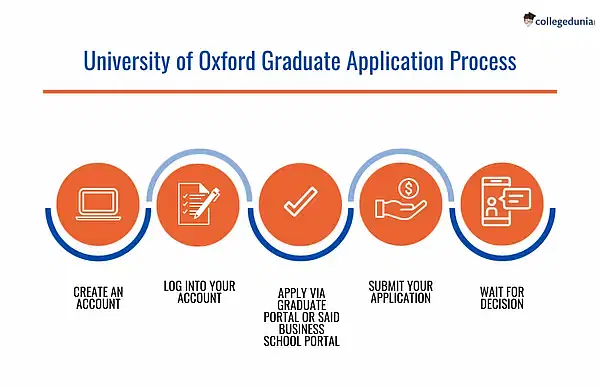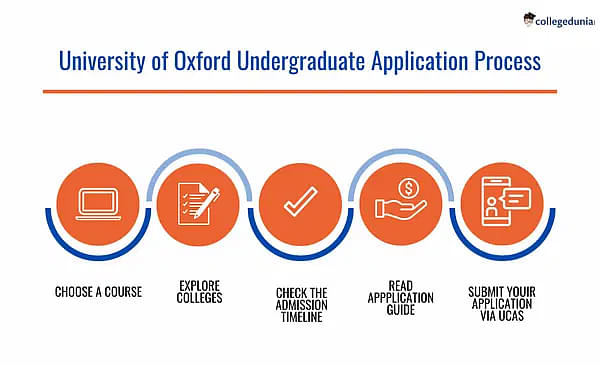University of Oxford offers admission in the terms of Michaelmas (October to December), Hilary (January to March), and, Trinity (April to June). The university has received 12,470 undergraduate applications, and 13,920 graduate applications in latest academic session.
University of Oxford received the 4th highest number of applications from Indian students (1,820) in last year. Among them, 65 applicants enrolled to the programs in University of Oxford. Currently, over 300 Indian students are studying postgraduate courses in University of Oxford. More than 200 Indian students are pursuing the undergraduate programs in the university.
University of Oxford has a competitive postgraduate acceptance rate of 14.47%. Indian students should have a minimum UG average of 60-70% for admission to the PG courses in the university. Students applying to the postgraduate courses will require these supporting documents:
- Statement of purpose
- Written work
- Portfolio
- 3 LORs
- Interview
- CV/resume
- Copy of passport
- Scholarship supporting statement
- Research proposal (Course-specific).
Details of admission to University of Oxford at undergraduate and postgraduate levels, top programs, and deadlines are provided below.
|
Table of Contents |
University of Oxford Top Masters Programs
University of Oxford has several programs ranked among the top 5 in the world. The university ranks at #1 in Anatomy and Physiology according to QS World University Rankings by Subject, 2024. University of Oxford ranks at #2 in the world for both Medicine, and, Law and Legal Studies.
University of Oxford ranks at #3 in both Engineering, and, Pharmacy Pharmacology. The university has secured the 4th place in Data Science and AI, and, Computer Science and Information Systems. Some top programs in University of Oxford and their corresponding admission requirements are as follows:
| Programs | Academic Qualification Requirements | English Proficiency Requirements | Supporting Document Requirements | Interview Requirement |
|---|---|---|---|---|
| Master of Science [M.Sc] Molecular and Cellular Medicine | First class (70%) or strong upper second class (60-70%) undergraduate degree with honours in Biological Sciences or related topics | IELTS: 7.0 with 6.5 in each section | TOEFL iBT: 100 with 25 in Speaking, 22 in Listening, 24 in Reading and Writing | Publications (Optional), evidence of motivation, research or work experience in any field, evidence of NHS or HSE trust support for clinical applicants, registration of 3 referees (at least 2 academic LORs), proposed field and title of research project, 500 words personal statement, 2000 words research proposal, official transcripts | Interview required |
| MSc Law and Finance | 70% or 60-70% in UG degree with honours in Law | IELTS: 7.5 with 7.0 in each section | TOEFL iBT: 110 with 25 in Speaking, 22 in Listening, 24 in Reading and Writing | Work experience in a relevant field (Optional but recommended), registration of 3 references | Interview based on application (Not held generally) |
| Master of Science [M.Sc] by Research in Engineering Science | 70% or 60-70% in UG degree with honours in Engineering or a relevant discipline | Registration of 3 referees, proposed field and title of research project, proposed supervisor name, official transcripts, CV/resume, 1000-1500 words research proposal | In person or other mode of interview | |
| Master of Science [M.Sc] Pharmacology | 70% or 60-70% in UG degree with honours in Biological or Chemical Science | CV or resume, official transcripts, SOP within 800 words, registration of 3 referees | Remote interview | |
| MSc in Advanced Computer Science | 70% in UG degree with honours in Computer Science or Mathematics, engagement in coding and implementing algorithms | Programming projects either in employment or study, engagement with coding and implementing algorithms, publications (If any), CV/resume, 1000 words SOP or personal statement, official transcripts, registration of 3 referees | Interview based on academic abiity | |
| Master of Science [M.Sc] Social Data Science | 70% in UG degree with honours in any subject | Registration of 3 referees, academic and/or professional, additional supporting documents, official transcripts, personal statement within 500 words, 1 essay of up to 2,000 words, excluding references and appendices | Video conference interview (In exceptional cases) of up to 30 minutes |
University of Oxford Acceptance Rate
University of Oxford has an undergraduate acceptance rate of 14.34%, for 3,300 available seats. The university has a postgraduate acceptance rate of 14.47%, offering 5,500 seats. University of Oxford MBA, offered by Saïd Business School has 97% international students including 23% students representing South Asia.
University of Oxford is home to 26,945 students representing 170+ countries. Currently, there are 550 Indian students, studying in University of Oxford. The admission statistics of University of Oxford across UG and PG levels are as follows:
| Level of Study | Applications Received | Available Seats | University of Oxford Acceptance Rate |
|---|---|---|---|
| Undergraduate | 23,000+ | 3,300 | 14.34% |
| Graduate | 38,000 | 5,500 | 14.47% |
University of Oxford Postgraduate Admissions
University of Oxford offers 200 master's level courses, and 120 DPhil (PhD) programs to international students. The admission requirements for the graduate programs in University of Oxford are as follows:
Application Portal: Graduate Application Portal
Application Fees: 75 GBP (7,968 INR)
Admission Requirements:
- Professional bachelor's degree (4 years) from a recognized institution or standard bachelor’s degree (3 years) from a recognized institution
- GPA or aggregate:
- 4 year degree: Minimum 60% for degrees from prestigious institution or 70% for degrees by other institution
- 3 year degree: Minimum 65% for degrees from prestigious institution or 70% for degrees by other institution
- If the program requires a master’s degree, the grade requirements are:
- 55% for pass grade
- 60% for merit grade
- 70% for distinction grade
- English proficiency test score:
- IELTS: 7.5 with 7.0 in each section
- TOEFL iBT: 110 with 25 in Speaking, 22 in Listening, 24 in Reading and Writing
Supporting Documents:
- 1000-2000 words research proposal (Course specific)
- Statement of purpose/ Personal statement
- Work experience in a relevant field
- Scholarship supporting statement
- Written work
- Interview
- Portfolio
- 3 LORs
- CV/resume
- Copy of passport

University of Oxford MBA Admissions
University of Oxford MBA program is offered through the Said Business School. Currently, there are 334 students enrolled in the Oxford MBA program, representing 63 countries. About 97% of these students are international students.
- Women make up 51% of the whole student body, and they have an average of 5 years of work experience.
- The applications for MBA at University of Oxford are accepted in four rounds throughout the year.
The requirements for Oxford MBA are as follows:
Application Portal: Said Business School Application
Application Fees: 150 GBP (15,910 INR)
Admissions Requirements:
- Undergraduate degree in any discipline
- 2 years of full-time work experience (Average work experience of current class: 6 years)
- Test scores:
- GMAT score: 650 or above (Current class has a median GMAT score of 690)
- GRE score: 160 (Verbal) | 160 (Quant)
- English language proficiency:
- IELTS: 7.5 with 7.0 in each section
- TOEFL iBT: 110 overall with 25 in Speaking, 24 in Reading and Writing, and 22 in Listening
- Online assessment
- Interviews
Documents Required:
- 2 academic or professional LOR
- CV (1 page)
- Written Work (250 words)
- Supporting statement
University of Oxford Undergraduate Admissions
University of Oxford offers 55 undergraduate programs to international students. The university looks for students interested in gaining knowledge and utilize their intellect in R&D. You must have demonstrated interest in your selected field to get selected by the university. Admission requirements for the undergraduate programs in University of Oxford are provided below:
Application Portal: UCAS
Application Fees: 28.50 GBP (3,025 INR)
Admission Requirements:
- Year XII qualification, studied with either the CBSE (All-India SSC) or CISCE (ISC) boards
- Overall grade of 90% with 95% or above in 3-4 subjects and 85% or above in remaining subjects (course specific)
- English proficiency test score:
- IELTS: 7.0 with 6.5 in each section
- TOEFL iBT: 100 with 25 in Speaking, 24 in Reading and Writing, and 22 in Listening
Note: University of Oxford does not accept standard 12th qualification from state board.
Documents Required:
- 1 letter of recommendation
- UCAS Personal statement
- Copy of the passport

University of Oxford UG Admission Deadlines
For admission to University of Oxford in UG level, you can start working on your UCAS application from June onwards. You can submit the application by October 15, 2024, for 2025 entry. If you are shortlisted for entry in 2025, you will be interviewed online in December 2024.
The important dates and deadlines for undergraduate admission in University of Oxford are provided below:
| Event | Dates |
|---|---|
| UCAS Application Opens | June 2024 |
| UCAS Application Deadlines | October 15, 2024 |
| Deadlines to Submit Written Documents | November 10, 2024 |
| Interview | December 2024 |
| Decisions | January 14, 2025 |
University of Oxford PG Admission Deadlines
University of Oxford has divided its academic year in 3 terms for postgraduate courses. The Michaelmas term with a span between October to December, Hilary term from January to March, and, Trinity term from April to June.
Most of the graduate courses at University of Oxford begin in Michaelmas term (early October). The application deadline for the graduates courses in University of Oxford are distinct for each program. Some courses have more than 1 deadline, considering applications in 2 or more separate batches.
University of Oxford Decision Dates
University of Oxford will notify the shorlisted candidates about the decision for 2025 entry on January 14, 2025. The decisions will be released via UCAS in the morning. The university provides 2 different types of offers:
- Conditional offers: To secure admission with a conditional offer, students require achieving certain examination results. These exams are based on the entrance requirement of selected courses.
- Open offers: These applicants are eligible for direct entry to University of Oxford.
Postgraduate applicants in University of Oxford usually receives application outcome from their respective department within 8 to 10 weeks after the application deadline. Successful applicants will receive a notification via email along with downloadable certificate of offer from the department. University of Oxford provides MBA application decisions in early November, late January, and mid April.
University of Oxford Selection Criteria
The admissions committee of University of Oxford evaluates your application holistically before making a final decision. The university has course-specific selection criteria for undergraduate programs. The tutors make decision based on these factors:
- Interview
- Prior academic attainment and predicted grades
- Any admissions test or written work required for your selected course
- Personal statement
- Academic reference
Known for its innovative approach to education and research, University of Oxford follows a strict admission policy. Meeting the minimum requirements will not guarantee admission to University of Oxford, due to the competition. Indian students are encouraged to carefully adhere to the admission process and submit the applications way ahead of the deadline.
FAQs
Ques. Is University of Oxford hard to get into?
Ans. Yes. University of Oxford is highly selective with an UG acceptance rate of 14.34%. The university has an equally competitive PG acceptance rate of 14.47%. While having a strong academic background holds a great significance, students are also assessed based upon their supplementary documents like:
- Course-specific admissions test or written work
- Personal statement
- Academic reference
- Interview.
Ques. Where to apply for University of Oxford?
Ans. Prospective international undergraduate students can apply to University of Oxford via UCAS portal. PG applicants are required to apply directly to through the university’s application portal.
Ques. How do I get into undergraduate courses in University of Oxford as an Indian?
Ans. Indian students with an overall grade of 90% with 95% or above in 3-4 subjects and 85% or above in remaining subjects can apply for University of Oxford admission. .
Ques. How much is the application fee at University of Oxford?
Ans. The postgraduate application fee at University of Oxford is 75 GBP (7,968 INR). Undergraduate applicants should pay the non-refundable UCAS fee of 28.50 GBP (3,025 INR). University of Oxford MBA application fee is 150 GBP (15,910 INR). You must have an IELTS score of 7.0 with 6.5 in each section or equivalent TOEFL iBT score as a proof of English proficiency. The supporting documents required are, 1 LOR, UCAS personal statement, and immigration documents.
Ques. What GMAT score is required for University of Oxford admission?
Ans. For admission to MBA in University of Oxford, applicants require a GMAT score of 650 or above. The current MBA class of University of Oxford has a median GMAT score of 690.
Ques. When does University of Oxford offer admission decision?
Ans. University of Oxford offer PG admission decision within 8 to 10 weeks of the application deadline. Undergraduate applicants will receive admission decision by January 14, 2025 for 2025 entry.
Ques. What GPA is needed to attend University of Oxford?
Ans. In order to have a high chance of being admitted to University of Oxford in the United Kingdom, applicants must maintain a minimum GPA of 3.7 (93%).
Ques. Can I submit my graduate application to Oxford before receiving English proficiency test results?
Ans. Yes, you can submit your graduate application without providing your English language test results. As long as your application has been submitted in time for the relevant deadline, along with all other required supporting documents, it will be assessed by the relevant academic department as normal. If you receive English language test results after you’ve applied, you should upload these to your application via Graduate Applicant Self-Service any time later.
Ques. Is there a graduate application fee waiver in University of Oxford?
Ans. Yes. Although all applicants must pay the 75 GBP (7,968 INR) postgraduate application fee, including those availing scholarships. The following applicants can get graduate application fee waiver in University of Oxford:
- Readmission applicants
- Students receiving maximum level of financial support for their UK undergraduate degree
- Residents of a country listed as low-income by the World Bank.
College Student Profiles
Course Finder - Search from 50K+ courses
Popular Streams:
Reviews
Most Popular Tags
7 Reviews Found
- Likes:
- It is a renowned university. I liked the tutorial system - groups of 2-4 students being taught by a professor after the main lectures. I chose maths because it always felt natural and enjoyable to me.,
- The course material, the gothic architecture, department facilities, the area, the food.
- Dislikes:
- The accommodation and its facilities, wifi, and the fact that the course is not as engaging as it could be (e.g. with more projects, in-person presentations, group activities)
Overview:
The terms are fast-paced and highly academic. Even though sometimes the academic load can get high, it was always manageable for me. The problem sheets favor quality over quantity. As for other social activities, there are lots of opportunities to join clubs and societies, little social events in your college and also your subject department. Lots of talks and workshops. We have formal dinners every now and then where you dress up. The exams are also traditionally taken and you must wear formal clothing.
Scholarship:
No
- Likes:
- Prestige and great faculty along. Additionally, Oxford University is very different from any university in terms of culture.,
- The friends/classmates, the city, the buildings/infrastructure, the accommodation.
- Dislikes:
- The Admin, the weather.
Overview:
Admin is not really great, it is not very systematic. But otherwise you meet a lot of smart people. I never thought I would enjoy going for debates but we have many debates at the Oxford Union where esteemed speakers from around the world come to exchange thoughts and ideas. The formal dinners let you explore the different colleges across Oxford University. There is almost no medical help available unless it is fatal so carry medicines/bandages etc.
Scholarship:
nope
Overview:
The candidates need to pass IELTS with a minimum score of 7 and minimum 100 in TOEFL. You apply through UCAS, as for any other university. The full information is contained in the University's Undergraduate Prospectus.To become a student at Oxford you need to be accepted by a particular college, though you apply through a central admissions system. If you don't know which college to name as your preference you can make an open application: details of this are also in the undergraduate prospectus. Candidates are shortlisted for interview on the basis of their academic record and promise, as detailed in the selection criteria. Interviews take place in December.
Overview:
I chose Oxford University for obvious reasons as it is top-ranked, and I needed foreign accreditation to progress in my teaching career. Plus, it was a distance learning program so I was able to study while I worked. It also had a residential module which gave me an opportunity to meet my peers from all over the world. Also, since the ratio of instructors to students is very low. Only 13 fellows were admitted each year, making it easy for professors to give individual attention to each student.
Scholarship:
No, I didn't receive any scholarship.
Overview:
Oxford is best for my chosen course. It is one of the only courses in the world that lets students gain practical experience in micromanipulation, in vitro maturation and embryo biopsy.
Scholarship:
No
Overview:
Because University of Oxford is one of the best university in the world, always top 10 in almost all university ranking website and Oxford also has a lot to offer to students
Scholarship:
Yes, I got scholarship from Indonesian Endowment Fund for Education which is 15,300 pounds/ year + tuition fee + visa + transport + seminar and conferences + thesis + paper publication and research fee.
Overview:
Oxford has a prestigious reputation and is one of the best universities in the world. This improves job prospects, as well as teaching and facilities provided, are high quality.
Similar Colleges


Robert Gordon University


University of Aberdeen


Aberystwyth University


University of Bath


Cranfield University


Queen's University Belfast


Ulster University


University of Reading















































Comments